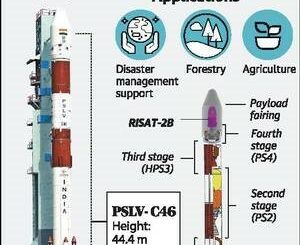National Current Affairs – UPSC/KAS Exams- 20th February 2020
Soil Health Card and Sustainable Agriculture
Topic: Agriculture
In News: Fifth year of the launch of Soil Health Card being observed across the country to create awareness about the benefits of the scheme.
More on the Topic:
- The scheme aims at issuing soil health cards to farmers every two years so as to provide a basis to address nutritional deficiencies in soil. The scheme ensures additional income to farmers by an increase in yields and it also promotes sustainable farming.
- The scheme has been introduced to assist State Governments to issue Soil Health Cards to all farmers in the country.
- It provides information to farmers on the nutrient status of their soil along with recommendations on the appropriate dosage of nutrients to be applied for improving soil health and its fertility.
- Infrastructure: The crucial infrastructure requirement for the programme has been provided through the setting up of 429 new static soil testing labs (STL) and strengthening of 800 existing ones, apart from 102 mobile STLs, 8,752 mini-STLs and 1,562 village-level STLs.
- As a result, the total soil testing capacity has increased from 1.73 crore to 3.01 crore samples per year.
- Organic Fertilisers: The Fertiliser (Control) Order 1985 has been amended from time to time to register new nutrient products and formulations. With growing demand for organic produce, the FCO is now also incorporating bio-fertilisers, organic fertilisers and non-edible de-oiled cakes, in addition to chemical fertilisers.
- The main sources of bio-fertilisers are microorganisms such nitrogen-fixing azotobacter, phosphate-solubilising bacteria and mycorrhizae fungi that promote uptake of nutrients by plants.
- Another potential tool for water and soil conservation is ‘biochar’, which also converges with the National Bamboo Mission. This high-quality charcoal produced by pyrolysis (decomposition at elevated temperatures) of ‘waste’ bamboo in the absence of oxygen can be used either as such or mixed with organic additives in a suitable ratio.
- Biochar can enhance crop yields by 5-40%, friendly mycorrhizal fungi by 40%, nutrient retention by 50% and water retention capacity of soils by 20%. It would, thereby, reduce the requirement of irrigation and promote resistance to various fungal and nematode diseases. By enduring in the soil for thousands of years, biochar also helps in mitigation of climate change via carbon sequestration.
Conclusion:
- The judicious application of fertilisers based on SHC prescription has multifold benefits in terms of improved soil health, safe food and mitigating climate change.
- Balanced use will also reflect in reduced water consumption, while at the same time protecting water bodies from run-off pollution.
- Farmer awareness about balanced fertilisation is being stepped up through the coordinated efforts of the departments of agriculture, cooperation & farmers’ welfare and fertilisers, besides the network of the Indian Council of Agricultural Research’s Krishi Vigyan Kendras.
- Farmer can, thus, be enabled to fulfill the mantra of ‘Swasth Dhara, Khet Hara’ (if the soils are healthy, the fields shall be green)!
Source: Hindu
India-Norway Task Force on Blue Economy
Topic: Economy
In News: India and Norway has opened the India-Norway Task Force on Blue Economy for Sustainable Development recently.
More on the Topic:
- The bilateral collaboration intends to manage the resources in the oceans in a sustainable manner.
- The India-Norway cooperation in the field of oceans is based on a shared interest in the blue economy and the sustainable use of marine resources. Both countries also desire to advance scientific knowledge about oceans.
- The purpose of the task force is to develop and follow up joint initiatives between the two countries.
- It also intends to mobilise relevant stakeholders from both Norway and India at the highest level, and ensure continued commitment and progress across ministries and agencies.
| · According to the World Bank, the blue economy is the “sustainable use of ocean resources for economic growth, improved livelihoods, and jobs while preserving the health of ocean ecosystem.” European Commission defines it as “All economic activities related to oceans, seas and coasts.
· It comprises renewable energy, fisheries, maritime transport, tourism, climate change, waste management. · It is also reflected in Sustainable Development Goal (SDG 14), which calls to conserve and sustainably use the oceans, seas and marine resources for sustainable development. · Blue economy, through sustainable use of oceans, has great potential for boosting the economic growth by providing opportunities for income generation and jobs etc. · It can support food security, and diversification to address new resources for energy, new drugs valuable chemicals, protein food, deep sea minerals, security etc. |
Source: Hindu
Topic: Government Schemes
In News: The Ministry of Textiles is organizing ‘Kala Kumbh – Handicrafts Thematic Exhibition’.
More on the topic:
- The objective of Kala Kumbh is to promote Geographical Indication (GI) crafts and heritage of India.
- The GI tag for goods corresponds to a specific geographical location. As of August 2019, 178 GI handicraft products were registered from all over India. These include Odisha Rasagola, Kondapalli Bommallu (Andhra Pradesh), etc.
- The exhibition is being organized through the Office of Development Commissioner (Handicrafts) under the Ministry of Textiles. It is sponsored by the Export Promotion Council for Handicrafts (EPCH).
- The EPCH was established under the Companies Act in the year 1986-87 and is a non-profit organization, with an object to promote, support, protect, maintain and increase the export of handicrafts.
Source: Hindu
Intellectual property (IP) Index
Topic: Reports and Indices
In News: The index ranked India at 40 among 53 countries, where it was evaluated on issues from patent and copyright policies to the commercialisation of IP assets and ratification of international treaties.
More on the Topic:
- Since 2016, India has improved the speed of processing for patent and trademark applications, increased awareness of IP rights among Indian innovators and creators, and facilitated the registration and enforcement of those rights.
- Last year India was ranked at 36th position out of 50 countries.
- India also continues to score well in the Systemic Efficiency indicator, scoring ahead of 28 other economies in these indicators.
- Challenges Ahead India: GIPC has identified several challenges for India. Prominent among them being patentability requirements, patent enforcement, compulsory licensing, patent opposition, regulatory data protection, transparency in reporting seizures by customs, and Singapore Treaty of Law of TMs and Patent Law Treaty.
| · Released by GIPC(the U.S. Chamber of Commerce’s Global Innovation Policy Center (GIPC).), the Index evaluates the IP infrastructure in each economy based on 45 unique indicators, which are critical to the growth of effective IP systems.
· The indicators encompass 8 categories of IP protection: patents, copyrights, trademarks, trade secrets, commercialization of IP assets, enforcement, systemic efficiency, and membership and ratification of international treaties. |
Source: The Hindu
Assisted Reproductive Technology Regulation Bill, 2020
Topic: Governance
In News: The Union Cabinet has approved the Assisted Reproductive Technology Regulation Bill, 2020 to monitor medical procedures used to assist people to achieve pregnancy.
More on the Topic:
- The Bill provides for a national Board which will lay down a code of conduct to be observed by those operating clinics.
- It will also formulate minimum standards for laboratory and diagnostic equipment and practices to be followed by human resources employed by clinics and banks.
- The States and Union Territories will also have to form State Boards and State authorities within three months of the notification of the proposed legislation.
- Under the proposed law, a national registry and registration authority will maintain a database to assist the national Board to perform its functions.
- The Bill also proposes stringent punishment for those who practise sex selection, indulge in sale of human embryos or gametes and those who operate rackets.
- The Bill will also ensure confidentiality of intending couples and protect the rights of the child.” She also said that in the Surrogacy Regulation Bill 2020, the government was looking to restrict the maximum age of surrogates from “above the marriageable age” to 50 years.
Significance of the Bill:
- India has one of the highest growths in the number ART centres and ART cycles performed every year.
- India has become one of the major centres of this global fertility industry, with reproductive medical tourism becoming a significant activity.
- This has also introduced a plethora of legal, ethical and social issues; yet, there is no standardisation of protocols and reporting is still very inadequate.
Source: Hindu
Topic: Polity and Governance
In News: Union Cabinet today approved the constitution of the Twenty-second Law Commission of India.
More on the Topic:
- The commission will function for a period of three years from its date of official constitution.
- The Commission will give recommendations on different aspects of law which are entrusted to it.
- It shall also undertake studies and research for bringing reforms in the justice delivery systems for elimination of delay in procedures and speedy disposal of cases among others.
- Law Commission of India is a non-statutory body constituted by the Government from time to time. The tenure of the twenty-first Law Commission ended in August 2018.
Composition:
- It will consist of:
- a full-time Chairperson;
- four full-time Members (including Member-Secretary)
- Secretary, Department of Legal Affairs as ex-officio Member;
- Secretary, Legislative Department as ex officio Member; and
- not more than five part-time Members.
Source: AIR
Scheme for formation and promotion of Farmer Producer Oganisations
Topic: Government Schemes
In News: The Cabinet Committee on Economic Affairs, chaired by the Prime Minister Shri Narendra Modi, has given its approval for 10,000 FPOs to be formed in five years period from 2019-20 to 2023-24 to ensure economies of scale for farmers.
More on the Topic:
- An FPO, formed by a group of farm producers, is a registered body with producers as shareholders in the organisation.
- It deals with business activities related to the farm produce and it works for the benefit of the member producers.
- The success of FPO depends on players such as Banks, Retailers and Corporate sector.
| About the Scheme
· It would be a new Central Sector Scheme titled “Formation and Promotion of Farmer Produce Organizations (FPOs)” to form and promote 10,000 new FPOs. · Initially there will be three implementing Agencies to form and promote FPOs, namely Small Farmers Agri-business Consortium (SFAC), National Cooperative Development Corporation (NCDC) and National Bank for Agriculture and Rural Development (NABARD). · States may also, if so desire, nominate their Implementing Agency in consultation with DAC&FW. · DAC&FW will allocate Cluster/States to Implementing Agencies which in turn will form the Cluster-Based Business Organization in the States. |
Significance of FPO:
- Small and marginal farmers do not have the economic strength to apply production technology, services and marketing including value addition.
- Through the formation of FPOs, farmers will have better collective strength for better access to quality input, technology, credit and better marketing access through economies of scale for better realization of income.
Source: NABARD
















